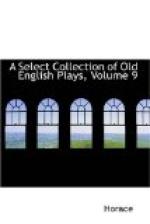CLARE. I come, I come; I pray, return; I come.
JOHN. I must not go without you.
CLARE. Be thou my usher, sooth, I’ll follow
you. [Exit.
He writes here to forgive him, he is married:
False gentleman, I do forgive thee with my heart;
Yet will I send an answer to thy letter,
And in so short words thou shalt weep to read them,
And here’s my agent ready: Forgive me,
I am dead.
’Tis writ, and I will act it. Be judge,
you maids
Have trusted the false promises of men:
Be judge, you wives, the which have been enforc’d
From the white sheets you lov’d to them ye loathed:
Whether this axiom may not be assured,—
Better one sin than many be endured:
My arms embracing, kisses, chastity,
Were his possessions; and whilst I live,
He doth but steal those pleasures he enjoys,
Is an adulterer in his married arms,
And never goes to his defiled bed,
But God writes sin upon the tester’s head.
I’ll be a wife now, help to save his soul
Though I have lost his body: give a slake
To his iniquities, and with one sin,
Done by this hand, and many done by him.
Farewell the world then, farewell the wedded joys
Till this I have hop’d for from that gentleman!
Scarborow, forgive me; thus thou hast lost thy wife,
Yet record, world,[371] though by an act too foul,
A wife thus died to cleanse her husband’s soul.
[Enter SIR JOHN HARCOP.]
HAR. God’s precious for his mercy, where’s
this wench?
Must all my friends and guests attend on you?
Where are you, minion?
CLARE. Scarborow, come, close mine eyes; for I am dead.
HAR. That sad voice was not hers, I hope:
Who’s this?
My daughter?
CLARE. Your daughter,
That begs of you to see her buried,
Prays Scarborow to forgive her: she is dead.
[Dies.
HAR. Patience, good tears, and let my words have
way!
Clare, my daughter! help, my servants, there!
Lift up thine eyes, and look upon thy father,
They were not born to lose their light so soon:
I did beget thee for my comforter,
And not to be the author of my care.
Why speakest thou not? some help, my servants, there!
What hand hath made thee pale? or if thine own,
What cause hadst thou, that wert thy father’s
joy,
The treasure of his age, the cradle of his sleep,
His all in all? I prythee, speak to me:
Thou art not ripe for death; come back again.
Clare, my Clare, if death must needs have one,
I am the fittest: prythee, let me go.
Thou dying whilst I live, I am dead with woe.
Enter THOMAS and JOHN SCARBOROW.
THOM. What means this outcry?
JOHN. O ruthful spectacle!
HAR. Thou wert not wont to be so sullen, child,
But kind and loving to thy aged father:
Awake, awake! if’t be thy lasting sleep,
Would I had not sense for grief, nor eyes to weep.




